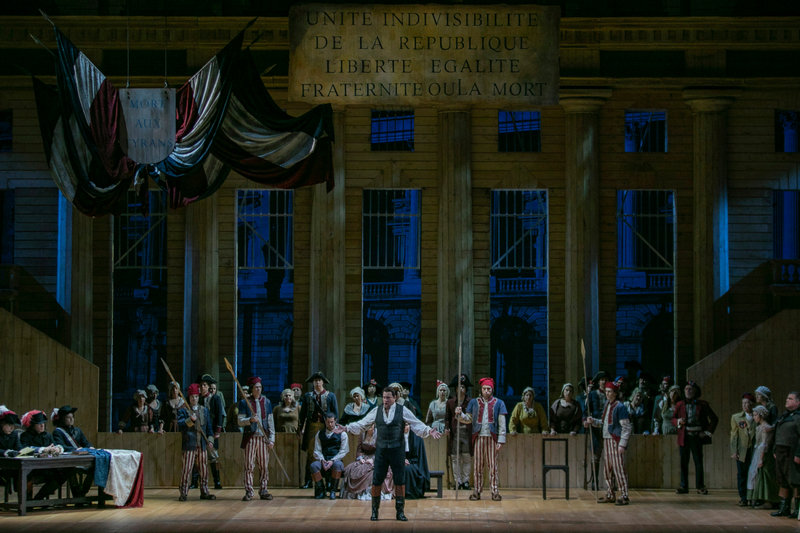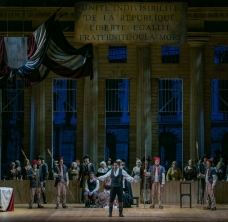Opera
Umberto Giordano
Available for on-demand streaming
until 31 December 2022

This production, part of a tribute to the 2021 bicentennial of the Greek Revolution, is made possible by a grant from the Stavros Niarchos Foundation (SNF) [www.SNF.org].
The life of the famous French poet André Chénier (1762-1794) was the subject of the most successful opera (set to a libretto by Luigi Illica) of Umberto Giordano ̶ one of the most representative exponents of operatic verismo, and in particular of the Giovane Scuola. The opera premiered at La Scala, Milan, on 28 March 1896, a century after the French Revolution ̶ which is also when the action is set- whose ideas decisively affected the developments in Greece that gave rise to the 1821 Revolution.
The hero who bears the name of the opera's title was born in Istanbul to a French father and a Greek mother. We first meet him in 1789 in the Parisian aristocracy circles supporting the French Revolution and joining the revolutionary movement along with Gérard. Gérard (a role based in part on the French Revolution hero Jean-Lambert Taillen) turns from a servant of aristocrats into a leading figure of the sans-cullotes, namely the people from the lower strata of the bourgeoisie who were actively involved in the revolutionary political struggle (sans-cullotes means "those without breeches" - because in contrast to the aristocrats who wore knee-breeches [cullotes], they wore trousers). However, their love for the same woman turns the friendship between the two men into a rivalry. Three years later, when Chénier gets arrested as a conspirator against the Revolution for decrying the atrocities committed under the Reign of Terror, Gérard is the one who will prepare the indictment against him. Although he will later realise his mistake and try to set the poet free, his effort will be in vain, and Chénier will be led to the guillotine.
On the title page of the score we read: "Drama in a historical setting...", and indeed, through his music, Giordano brings out not only the erotic element and passions of his heroes, but also the conflict between the rivaling social groups and the atmosphere of the era of the French Revolution: the gavotte -typical aristocratic dance- is contrasted with Ça ira, Carmagnola and La Marseillaise.
The timeless values portrayed in the opera -the French Revolution motto for Liberty, Equality, Fraternity-, combined with the intense erotic and dramatic elements highlighted through Giordano's enchanting music, is the reason why Andrea Chénier has been so appealing to opera audiences to this day.
Filmed at the GNO Stavros Niarchos Hall at the Stavros Niarchos Foundation Cultural Center on 28 and 31 January 2021.
At a glance - Synopsis
The composer
Umberto Giordano was born in 1867 in Foggia, Southern Italy, and studied at the Naples Conservatoire. Although his one-act opera Marina did not win the Sonzogno publishing house's competition for young composers in 1890, it did however draw enough attention so that he would be commissioned to compose a new work, Mala vita (1892), which was hugely successful in Rome, Naples, Vienna, Berlin and Milan. In 1896 Andrea Chénier's presentation at La Scala, Milan, made Giordano famous, and two years later his Fedora starring Enrico Caruso made him rich. Giordano died in Milan in 1948 at the age of 81.
The opera
Labelled as a drama in a historical setting, the opera Andrea Chénier is focused on the late years of poet André Chénier.
Premieres
The world premiere of Andrea Chénier took place at La Scala, Milan, on 28 March 1896 with huge success. The main roles were performed by stars of the time. Andrea Chénier was first performed by the Greek National Opera -which first opened in 1940- on 13 March 1965 at the Olympia Theatre.
Act I
On the eve of the French Revolution. During a reception at the Coigny's château, Gérard, the master of the household, is indignant when he sees his father in a corner of the ballroom, exhausted by the long years of heavy work in the service of the nobles. Among the guests is poet Andrea Chénier. Maddalena, daughter of the Countess of Coigny, asks him to improvise a poem. He responds that no one can force inspiration. However, annoyed by the ensuing comments, he improvises some lyrics about human misery, while denouncing the powerful of this world, the state and the church. The ball is interrupted by the voices of insurgent peasants asking for food. Gérard quits and throws his livery at the feet of the Countess. After the revolutionaries leave, the Countess reflects on her charities and calms her consciousness. The reception continues.
Act II
Paris, 1794. Five years later, Chénier is disappointed with the reign of Terror. His friend, Roucher, gives him a passport and encourages him to leave the country, since, as he reminds him, his association with general Dumouriez has made him a suspect. The poet is reluctant, as an unknown woman sent him a letter asking to meet him on that same evening. She is Maddalena, and despite the risk, the two youngsters meet and confess their love for each other. Gérard who is now a follower of Robespierre, namely in the opposite camp, shows up. He tries to kidnap Maddalena, but Chénier wounds him, and Roucher gets the girl out of there. Believing he is dying, Gérard advises Chénier to avoid the wrath of prosecutor Fouquier-Tinville, his enemy, and to protect the girl. Chénier gets away. When help comes and Gérard is asked to reveal his assailant, he refuses to do so.
Act III
Chénier has been arrested and Gérard writes down his indictment, declaring him an enemy of the Revolution. Maddalena rushes to Gérard, asking him to save Chénier. Gérard, who has been secretly in love with Maddalena since childhood, asks her to give herself to him in return. When Maddalena agrees, Gérard realises the magnitude of her feelings for Chénier and backs off. During the trial, despite the impressive way in which Chénier defends himself, Gérard can't seem to be able to help him, although he confesses that the accusations he himself wrote down were not true. The poet is sentenced to death.
Act IV
Chénier is waiting for his execution in the prison of Saint-Lazare. With Gérard's aid, Maddalena manages to get into the prison, where she changes places with another female prisoner, determined to die by her loved one's side.
Creative team - Cast
Conductor Philippe Auguin
Staging Nikos Petropoulos
Revival director Ion Kessoulis
Choreography Fausta Mazzucchelli
Choreography revival, movement Stratos Papanoussis
Lighting revival Christos Tziogkas
Chorus master Agathangelos Georgakatos
Andrea Chénier Marcelo Álvarez
Carlo Gérard Dimitri Platanias
Maddalena di Coigny Maria Agresta
Bersi Marissia Papalexiou
La Contessa di Coigny Ines Zikou
Madelon Julia Souglakou
Roucher Yanni Yannissis
Pietro Fléville / Schmidt Vangelis Maniatis
Fouquier-Tinville George Mattheakakis
Mathieu Kostis Rassidakis
An Incroyable Christos Kechris
The Abbé Nicholas Stefanou
Master of the household Marinos Tarnanas
Dumas Konstantinos Mavrogenis
With the Orchestra, Chorus and members of the Ballet the GNO
With a 10-euro ticket viewers can enjoy this production from the comfort of their homes at nationalopera.gr/GNOTV/en, at any time they choose, on their computer, ipad, TV or mobile phones. The ticket offers the possibility to access the performance for an unlimited number of times over the course of a 30-day period starting from the first streaming.

GREEK NATIONAL OPERA